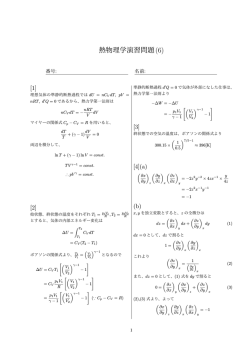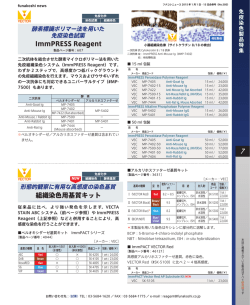
downloading
OpenFoamのためのC/C++
第3回 OpenFoamで勉強るテンプレート
田中昭雄
1
目的
この勉強会の資料があれば、
OpenFoamカスタマイズ時にC/C++で迷わない
2
予定
•
•
•
•
•
•
第1回
第2回
第3回
第4回
第5回
第6回
メモリ管理
CFDの例で勉強するクラス
OpenFOAMで勉強するテンプレート
OpenFOAMカスタマイズ
未定
未定
3
今回のテーマ
テンプレート機能を使えるようになる
4
今回の前提
• C言語で
–
–
–
–
配列を使ったことがある
構造体を使ったことがある
関数を使ったことがある
includeファイルを使ったことがある
• クラスという言葉を聞いたことがある
• C++ベースで解説していきます
5
Agenda
•
•
•
•
テンプレート概要
テンプレート関数
テンプレートクラス
OpenFoamのVector
6
Agenda
•
•
•
•
テンプレート概要
テンプレート関数
テンプレートクラス
OpenFoamのVector
7
テンプレートとは
型指定を利用側で定義することで、コード重複を防ぐ
(型に対して汎用的なコード記述が可能)
テンプレートの活用例
平均計算関数
利用方法
template<typename T>
T average(int n, T* seq)
{
T sum = 0;
for(int i = 0; i < n; ++i)
{
sum += seq[i];
}
return sum / n;
}
int main()
{
int n = 3;
double[] seq = {0.1, 2.5, 3.2};
std::cout << average<double>(n, seq) << “¥n”;
return 0;
}
型違い同じ機能を1つの定義で実現
8
テンプレートとは
型違い同じ機能は酷似したコードになりやすい
テンプレートの活用しない場合
float型の平均計算関数
double型の平均計算関数
float average(int n, float* seq)
{
float sum = 0;
for(int i = 0; i < n; ++i)
{
sum += seq[i];
}
return sum / n;
}
double average(int n, double* seq)
{
double sum = 0;
for(int i = 0; i < n; ++i)
{
sum += seq[i];
}
return sum / n;
}
バグがあると全ての型違いに対して修正が必要
9
テンプレート機能一覧
今回の対象はテンプレート関数、テンプレートクラス
テンプレート
テンプレート
関数
共通
機能
テンプレート
クラス
特殊化
テンプレート
引数
今回は対象外
10
Agenda
•
•
•
•
テンプレート概要
テンプレート関数
テンプレートクラス
OpenFoamのVector
11
テンプレート関数
関数の戻り値・引数を抽象化した関数
平均計算関数
利用方法
template<typename T>
T average(int n, T* seq)
{
T sum = 0;
for(int i = 0; i < n; ++i)
{
sum += seq[i];
}
return sum / n;
}
int main()
{
int n = 3;
double seq = {0.1, 2.5, 3.2};
std::cout << average<double>(n, seq) << “¥n”;
return 0;
}
12
テンプレート関数
テンプレート引数は複数指定が可能
最小値取得関数 例1:
最小値取得関数 例2:
template<typename T>
T min(T a, T b)
{
if(a < b) return a;
return b;
}
template<typename T1, typename T2, typename T3>
T3 min(T1 a, T2 b)
{
if(a < b) return a;
return (T3)b;
}
利用方法
利用方法
int main()
{
int a = 3, b = 4;
int m = min(a, b);
return 0;
}
※型が自明の場合は
利用時に省略可能
int main()
{
int a = 3;
float b = 2.1;
double m = min<double>(a, b);
return 0;
}
13
Agenda
•
•
•
•
テンプレート概要
テンプレート関数
テンプレートクラス
OpenFoamのVector
14
テンプレートクラス
メンバ変数をテンプレート・メンバ関数をテンプレート関数
3次元ベクトルクラス例:
template<typename T>
class Vector3D
{
public:
T x, y, z;
Vector3D(T X, T Y, T Z)
{ x = X, y = Y, z = Z; };
~Vector3D()
{};
T innerProduct(const Vector3D<T>& vec) const
{
return x * vec.x + y * vec.y + z * vec.z;
};
};
15
利用時の注意
型が一致していること
3次元ベクトルクラス利用例
OKな場合:
template<typename T>
class Vector3D
{
public:
T x, y, z;
int main()
{
Vector3D<int> a(10, 10, 10);
Vector3D<int> b(2, 3, 4);
std::cout << "inner product = “
<< a.innerProduct(b) << "¥n";
return 0;
Vector3D(T X, T Y, T Z)
{ x = X, y = Y, z = Z; };
}
~Vector3D()
{};
Inner product = 90
T innerProduct(const Vector3D<T>& vec) const
{
return x * vec.x + y * vec.y + z * vec.z;
};
};
16
利用時の注意
型が一致していること
3次元ベクトルクラス利用例
NGな場合:
template<typename T>
class Vector3D
{
public:
T x, y, z;
int main()
{
Vector3D<int> a(10, 10, 10);
Vector3D<double> b(2.001, 3, 4);
std::cout << "inner product = “
<< a.innerProduct(b) << "¥n";
return 0;
Vector3D(T X, T Y, T Z)
{ x = X, y = Y, z = Z; };
}
~Vector3D()
{};
T innerProduct(const Vector3D<T>& vec) const
{
return x * vec.x + y * vec.y + z * vec.z;
};
};
コンパイルエラー
17
コンパイルエラー解説
メンバ関数innerProduct()の引数の型の不一致
3次元ベクトルクラス:
利用側:
template<typename T>
class Vector3D
{
…
T innerProduct(const Vector3D<T>& vec) const
{
return x * vec.x + y * vec.y + z * vec.z;
};
};
int main()
{
Vector3D<int> a(10, 10, 10);
Vector3D<double> b(2.001, 3, 4);
innerProduct()の引数はVector3D<T>型
変数aの型はVector3D<int>
Vector3D<int>のメンバ関数
innerProduct()の引数はVector3D<int>
Vector3D<double>は
18
引数として受け取れない
std::cout << "inner product = “
<< a.innerProduct(b) << "¥n";
return 0;
}
対策
メンバ関数innerProduct()をテンプレート関数化
3次元ベクトルクラス:
利用側:
template<typename T>
class Vector3D
{
…
template<typename T2>
T innerProduct(const Vector3D<T2>& vec) const
{
return (T)(x * vec.x + y * vec.y + z * vec.z);
};
};
int main()
{
Vector3D<int> a(10, 10, 10);
Vector3D<double> b(2.001, 3, 4);
型Tにキャスト
std::cout << "inner product = “
<< a.innerProduct(b) << "¥n";
return 0;
}
Inner product = 90
自動型変換(たとえばdoubleからint)の
コンパイル時警告発生を防ぐため
19
対策
型違い(= 数値精度の違い)わかりづらいので要注意
3次元ベクトルクラス:
利用側:
template<typename T>
class Vector3D
{
…
template<typename T2>
T innerProduct(const Vector3D<T2>& vec) const
{
return (T)(x * vec.x + y * vec.y + z * vec.z);
};
};
int main()
{
Vector3D<int> a(10, 10, 10);
Vector3D<double> b(2.001, 3, 4);
std::cout << "inner product1 = “
<< a.innerProduct(b) << "¥n";
std::cout << "inner product2 = “
<< b.innerProduct(a) << "¥n";
return 0;
}
Inner product1 = 90
Inner product2 = 90.01
20
ビルド時の注意
ヘッダファイルに定義記述が必要
Vector3D.h(宣言を記述)
Vector3D.cpp(定義を記述)
template<typename T>
class Vector3D
{
public:
T x, y, z;
#include <Vector3D.h>
Vector3D(T X, T Y, T Z);
~Vector3D();
template<typename T2>
T innerProduct(const Vector3D<T2>& vec) const;
};
template<typename T>
Vector3D<T>::Vector3D<T>(T X, T Y, T Z)
{ x = X, y = Y, z = Z; }
template<typename T>
Vector3D<T>:: ~Vector3D()
{};
template<typename T>
T Vector3D<T>:: innerProduct(const Vector3D<T>& vec) const
{
return x * vec.x + y * vec.y + z * vec.z;
}
利用側コードのコンパイル時に、
コンパイラが定義を見つけられずビルドエラー
21
ビルド時の注意
利用側コードコンパイル時にテンプレート定義たどれないため
関数の定義
Vector3D.h
インクルード
Vector3D.cpp
template<typename T>
T Vector3D<T>:: innerProduct(const Vector3D<T>& vec) const
{
return x * vec.x + y * vec.y + z * vec.z;
}
宣言のみ
定義なし
関数の利用側
インクルード
main.cpp
int main()
{
Vector3D<int> a(10, 10, 10);
Vector3D<double> b(2.001, 3, 4);
std::cout << "inner product = “
<< a.innerProduct(b) << "¥n";
return 0;
}
22
ビルド時の注意
解決策
• 定義も全てヘッダファイルに記載
• 定義のみを記述したヘッダファイルをインクルード
Vector3D.h
template<typename T>
class Vector3D
{
public:
T x, y, z;
インクルード
Vector3D_Impl.h
宣言のみ
定義なし
宣言なし
定義のみ
Vector3D(T X, T Y, T Z);
~Vector3D();
template<typename T2>
T innerProduct(const Vector3D<T2>& vec) const;
};
インクルード
main.cpp
#include “Vector3D_Impl.h”
23
Agenda
•
•
•
•
テンプレート概要
テンプレート関数
テンプレートクラス
OpenFoamのVector
24
OpenFoamのVector
ベクトルはテンプレートクラス
Form, Cmpt, nCmpt
VectorSpace
ベクトル要素
演算用構造体に近い
template<class Form, class Cmpt, int nCmpt>
class VectorSpace
{
…
Cmpt v_[nCmpt];
…
};
Cmpt型(int / float / double)の
nCmpt次元ベクトル
(FormはCmptと基本的に一致。※CRTPイディオム)
Cmpt
Vector
3次元ベクトル
template<class Cmpt>
class Vector
: public VectorSpace<Vector<Cmpt>, Cmpt, 3>
{
…
};
3次元ベクトルとして定義
25
ただし型(int / float/ doubleなど)は利用側で決定
OpenFoamのVector演算
ベクトル演算はテンプレート関数
ベクトル同士の足し算(演算子のオーバーロード)
template<class Form, class Cmpt, int nCmpt>
inline Form operator+
(
const VectorSpace<Form, Cmpt, nCmpt>& vs1,
const VectorSpace<Form, Cmpt, nCmpt>& vs2
)
{
Form v;
VectorSpaceOps<nCmpt, 0>::op(v, vs1, vs2, plusOp<Cmpt>());
}
足し算の実装は
・VectorSpaceOps<nCmpt, 0>
・plusOp<Cmpt>
Formは
VectorSpace<Foam, Cmpt, nCmpt>
と一致する必要あり
26
OpenFoamのVector演算
VectorSpaceOpsクラスは抽象化したベクトル演算用
VectorSpaceOpsクラスの定義:
template<int N, int I>
class VectorSpaceOps
{
public:
static const int endLoop = (l < N-1) ? 1 : 0;
…
template<class V, class V1, class Op>
static inline void op(V& vs, const V1 vs1, const V1& vs2, Op o)
{
vs.v_[l] = o(vs1.v_[l], vs2.v_[l]);
VectorSpaceOps<endLoop*N, endLoop*(l+1)>::op(vs, vs1, vs2, o);
}
…
};
メンバ関数opはN次元のベクトルのI番目の要素の演算
演算終了後、I+1番目の演算を実行するVecstorSpaceOpsのメンバ関数opを呼び出し
27
(再帰処理(のような)プログラミング)
OpenFoamのVector演算
各演算はテンプレートクラスのファンクタ
足し算の実行呼び出しはVectorSpaceOps<nCmpt, 0>::op(v, vs1, vs2, plusOp<Cmpt>());
template<int N, int I>
class VectorSpaceOps
{
…
static inline void op(V& vs, const V1 vs1, const V1& vs2, Op o)
{
vs.v_[l] = o(vs1.v_[l], vs2.v_[l]);
template<class T>
VectorSpaceOps<endLoop*N, endLoop*(l+1)>::op(vs, vs1, vs2, o);
class plusOp
}
{
…
Public:
};
T operator()(const T& x, const T& y) const
{
return x + y;
}
};
※コンパイル時に自動生成されるコード
28
OpenFoamのVectorまとめ
Vector使うのは簡単だが、内部実装はややこしい
Form, Cmpt, nCmpt
利用
VectorSpace
ベクトル実装
Cmpt
演算用実装群
N, I
Cmpt
VectorSpaceOps
plusOps
演算時の
演算対象要素の制御
要素の演算実装
Vector
3次元ベクトル
利用
プログラマ
29
© Copyright 2026

